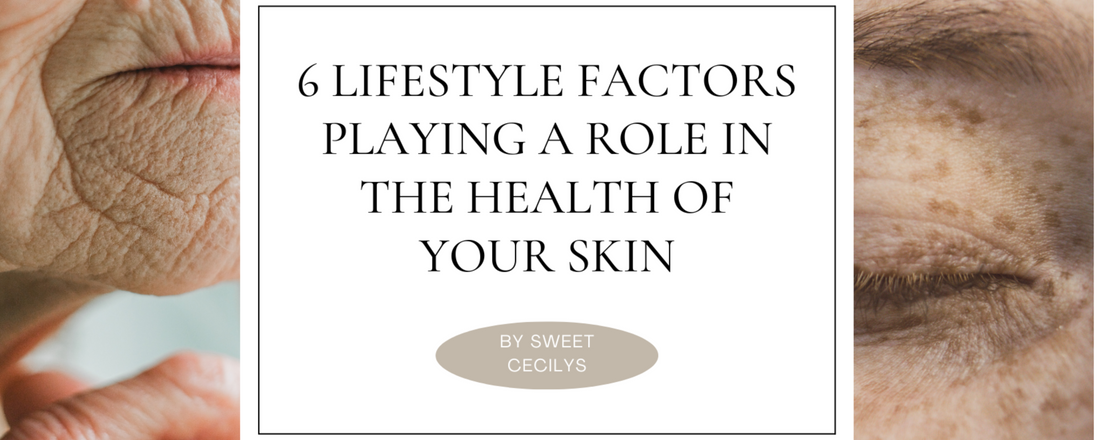
6 Lifestyle Factors Playing a Role in the Health of Your Skin
Share
The products that you put on your face play a big role in the health of your skin. Especially if you are using products which aren’t suitable for you skin type, this can cause a whole range of skin problems. However, it’s not just your choice of toner or moisturiser that may affect how your skin looks and feels. How you go about your daily life can disturb the health of your skin. Keep reading to find out just how much your lifestyle factors can affect your face and body.
Sun Exposure –
Being laid on a sun bed or under the glorious warmth of the sun is something that most of us crave all year round. With some of us making up to the lack of Vitamin D with a quick 9 minutes on the local sun bed. Either way, the exposure to the bright UV rays causes changes to your skin in several ways.
The most notable change to your skin is how it darkens (aka a suntan). When the sun hits your skin, changes are made to your cells DNA, along with this the UV rays promote increased melanin production. As a result, the skin starts to darken.
A tan is desired by many but, it comes at a cost to your skin. Too much exposure to the sun will penetrate the skin deeply and potentially damage or even kill the cells off. This can potentially lead to skin cancer if appropriate precautions are not taken.
The sun also causes freckles as melanin production is produced more than usual. Freckles are usually harmless and come and go depending on how much you are exposed to the sun. Moles can also grow because of sun exposure. It’s important to keep an eye on these ones if they change in colour or size as they could become cancerous.
If you are going to be exposed to the sun, ensure that you are protected with a sun cream that is factor 30 or above. Apply the sun cream regularly to maximise protection from the sun. Also try to use foundation and creams with added SPF if you are opting to wear makeup when in the sun.
Unbalanced Diet –
As the saying goes, you are what you eat. Therefore, if your diet is full of junk food, the chances are that your skin will suffer the consequences.
Essential fatty acids such as Omega-3 can help to maintain healthy skin when it is consumed or found in skincare products. On the other hand, too much fatty and processed foods can negatively affect your skin.
Several types of food can trigger problematic skin conditions such as acne. Also, you may find that your skin is more dried out or excessively oily if your diet is high in sugar, salt, and saturated fat. Eating too much sugar can impair the body’s natural ability to produce collagen which can lead to the skin to become wrinkled and stiff.
If your skin is appearing to look dull and almost lifeless, you may be consuming too much salt. A diet high in salt will no doubt dry your face out as it pulls the important moisture away from the skin.
Saturated fats which are found in foods such as cheese and meat can cause you to have breakouts and even acne. This is down to foods in this category simulating hormones that can trigger acne. Insulin growth factor is much higher when these types of food are consumed, and this is what contributed towards the increase of hormone levels.
Exercise –
Regular exercise can be helpful to the skin but, at the same time it may be a hinderance. When our heart rate is higher due to working out, the oxygenated blood being transported around the body is moving much quicker. The blood carries important nutrients which help to nourish skin cells. The increased flow of blood also helps to improve your skin by transporting waste such as free radicals away from the cells on the surface of your skin.
As a result, your body will increase the production of collagen and skin cell regeneration which helps your skin to appear glowing and youthful.
On the other hand, exercising makes you sweat and unfortunately, this is the perfect place for bacteria to thrive. Add the already growing bacteria to some gym equipment which is used by hundreds of people daily, spots are almost inevitable. This does not mean that you should avoid exercise at all costs because that really isn’t the case.
Practising good hygiene at the gym can be the difference between healthy glowing skin and a face full of spots.
Here are a couple of ways you can make a difference –
- Take a towel to dry off your sweat.
- Wash your hands before and after your exercise.
- Spray down equipment before and after use with an antibacterial spray.
Swimming (Chlorine) –
If you have ever been swimming, you will know how drying chlorine can be to your hair. Well, it is the same to your skin too. Whilst chlorine is added to a swimming pool to fight off bacteria, the chemical causes chaos to your skin.
Exposure to chlorinated water can lead to a range of issues. Your skin will become dried out due to the chemicals ability to strip away natural oils. Chlorine can also speed up the skins natural ageing process, which can lead to dull and saggy looking skin.
There are several ways that you can minimise the effects of chlorine on your skin –
- Shower before and after you go in the pool, this will hydrate the skin and reduce the amount of chlorinated water that is absorbed.
- Moisturise after your shower as this will add a good level of hydration back to your skin.
Alcohol –
Drinking alcohol may seem like fun at the time but, I’m sure the same can’t be said about the following day. The dreaded hangover… It’s not just your mind and body that can feel fragile after a couple in the pub, you skin can suffer too. You may have noticed that your skin tends to look dull and dried out the next day, and this is mainly down to the alcohol.
As alcohol is classed as a diuretic, your body is encouraged to produce and release more urine. As your body does this, you will start to lose more salt and water than usual, this can lead to your skin becoming dehydrated.
If you are on a night out, the chances are that you will not be having an early night to bed. However, when you do eventually get to bed, you may fall to sleep straight away. Alcohol often makes you wake up multiple times through the night and as a result your sleep is disturbed. When you experience disturbed sleep over a period of time, there will be changes to the appearance of your face. These include more wrinkles, dull complexion, dark under eyes.
To reduce the effects of alcohol on your skin, you should stick to the recommended units but also drink water in between the next drink.
Smoking –
Smoking cigarettes has a range of negative effects that can impact all aspects of your health, including your skin. If you smoke, you may notice that one of the most prominent changes to your face is wrinkles and fine lines. Nicotine and chemicals which are found in cigarettes cause the blood vessels in your skin to narrow. As a result, the natural flow of oxygenated blood which carries important nutrients is reduced.
These ‘smokers’ lines also become prominent around your lips as smoking encourages you to constantly purse you lips together, tensing up the muscles around the mouth. Overall, your skin will appear to age at a much quicker rate.
Aside from the deep lines, smoking also increases the melanin production within the skin. Like when we are in the sun, the increased level of this chemical can cause the skin to darken. However, unlike catching a suntan where the dark areas of the skin are even across the whole body, smoking causes dark spots.
Conclusion –
Understandably you will encounter the above lifestyle factors on a regular basis. Therefore, learning how to minimize the effects of them on your skin will go a long way.
Pair this understanding with a good skincare routine and your skin will thank you!

